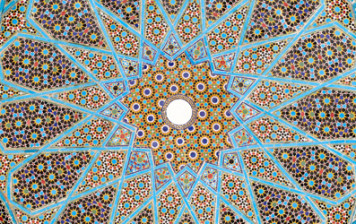
Richard Penaskovic
Ever since 9/11 the entire Western world has been gripped with anxious fear as to what some Muslims might do next. Hardly any journalist in the Western world speaks about moderate or liberal Islam, although plenty of Muslims around the globe fall into that category. My proposed paper deals with the thought of Fethullah Gülen, a moderate Muslim. I argue that Gülen may be a bridge toward better understanding between Islam and the West because of his views on peace, tolerance, and interfaith dialogue and because of his optimistic view of the future relations between the two aforementioned blocs.
We Live In a Global World
The West often views globalization in economic terms, namely, as the free and untrammeled movement of capital, goods, labor, and services across borders. In other words, globalization refers to the integration of technologies, nations, and markets to an unprecedented degree. However, globalization has taken on a different meaning in the Middle East and North Africa (MENA) region. There globalization is perceived in mainly ideological terms and hence attacked as a new brand of imperialism, although some like King ‘Abdullah of Jordan view globalization in positive terms. In the MENA region many people see globalization as a threat to their cultural, economic, or political independence.
Fethullah Gülen thinks of globalization in more than economic and ideological terms. For him globalization is a more encompassing term. It refers to connectivity and interdependence in all areas of life, cultural, ecological, economic, political, religious, social, and technological. Gülen would be comfortable in saying that globalization is the process by which the experience of everyday living is becoming standardized around the world.
Gülen finds the order, organization, and harmony in the world completely fascinating. He does not believe that this order and harmony derive from matter or come about randomly through chance. Rather, in his view everything that happens in the universe takes place according to certain laws. The most trifling event cannot occur without putting into the equation one who has an absolutely perfect knowledge of the universe and who possesses absolute power. That one is God the Creator. Gülen argues that God reveals himself in the book of nature, which addressed to humanity as a whole, makes known its Author.
Islam and the West have Become Estranged from One Another
In speaking about Islam and the West several important distinctions must be made. First, one must distinguish between Islam as a religion and Islamism as a political ideology. This distinction is implicit in Gülen’s writings, for example, in his essay, “True Muslims Cannot Be Terrorists.” As a religion Islam insists very strongly on peace, love, and tolerance. For Gülen love binds existence. Gülen notes that Muhammad, a man of affection, was given the title, ‘Habibullah,’ which comes from the word, habib, meaning ‘he who loves God and is loved by God.’
Gülen narrates several stories (hadith) from the Prophet Muhammad that make the point there is no room for hatred in Islam or in the multicolored world of its ambassador, Muhammad, the Prophet, may his name be blessed. For Gülen the entire Qur’an has tolerance and forgiveness as its foundation.
Islamism, though draped in religious imagery and presented in apocalyptic language, has more in common with secular ideologies of terror than it does with the Islamic religion. For example, just as the Irish Republican Army cannot in any way be equated with Roman Catholicism, so Islamism as an ideology cannot be thought of in the same breath as the Islamic religion.
The Crusades have made Muslims wary of entering into dialogue with Christians but many other factors also play a role. For example, Gülen points out that, in the twentieth century, far more Muslims have been killed by Christians than all Christians were killed by Muslims throughout the march of history. Attacks by Europeans collapsed the Ottoman Empire, while Christendom’s portrayal of Islam as a crude, distorted version of Judaism and Christianity upsets many Muslims to this very day. In hopes of building a better future, Gülen insists on interfaith dialogue as the key to overcoming the historical conflict between Islam and the West. Gülen says, in effect, “Let the healing begin.” We now turn to this extremely important matter of dialogue.
Dialogue is the Key
Despite the tension and struggles between Muslims and Christians for almost fourteen centuries, Gülen calls interfaith dialogue a necessity. Throughout his writings Gülen insists that for interfaith dialogue to succeed, we must forget the past, ignore polemics, and focus on the points both religions have in common. He notes that all revealed religions are based on peace, security, and world harmony. Like Jesus’ call to “turn the other cheek,” Gülen exhorts us to return good for evil and overlook discourteous treatment.
Should Muslims engage in dialogue with Jews and Christians? Based on his reading of the Qur’an Gülen answers with a resounding “yes.” At the beginning of the Qur’an in 2:2-4 people are called to accept the former prophets of both the Hebrew Scriptures and the New Testament and their books. Gülen interprets this passage as sending an important message in terms of establishing dialogue with Jews and Christians. In 29:46 of the Qur’an we are enjoined not to dispute with People of the Book except with means better than mere disputation. The Qur’an thus gives us a method of how dialogue should be conducted with Jews and Christians. Based on his reading of the Qur’an Gülen believes that tolerance should be extended not only to Jews and Christians but to all people.
In short, Mr. Gülen sees dialogue as a give and take between two or more parties involving respect, honesty, and compassionate love. In dialogue one must retain self-integrity while encountering the other as a true other, who is neither falsely similar, nor too alien from me. Not only is interfaith dialogue critical to peace in today’s world. There must also be a dialogue of cultures, viz., a dialogue between Islam and the West.
Love Conquers All
Gülen speaks of love in conjunction with compassion, forgiveness, and tolerance. For him these are the pillars of dialogue and basic human values. Love has the ability to overcome every force, elevate every soul that absorbs it, and it also prepares the soul for the journey to eternity. Love is, then, our human way of making contact with eternity. Mr. Gülen speaks eloquently of love as the greatest power, the most radiant light, and the chain that binds humans one to another. On the individual level love is the sultan that reigns on the throne of the human heart. On the social level there is nothing more lasting or more real than love in any nation or society. For Gülen it is axiomatic that love should be as vast as the oceans. Love calls us to take every soul to our bosom.
Genuine love of God means to stand in God’s presence, wholly set on the Beloved, and mindful that complete union with God will only occur in the afterlife. A persons’ love for God varies in accordance with the degree of one’s obedience to the Beloved. To come closer to God in true love, one must fight to overcome one’s faults and deficiencies, says Gülen. Those individuals on the highest stage of love are illumined with the light of God’s being and are in touch with the spiritual world. These favored souls recognize that they are an inspiration to those with whom they come into contact. Gülen would say that one’s true identity and personality come from one’s inner spirit. The more humans are filled with the love of God, the more that they can say with the prophet Abraham that “I love not things that set”.
Imagine what the world would look like if more people possessed true, spiritual love. What a difference this would make if leaders of nations possessed such a deep, dynamic, and transforming love. If they did, they could solve an entire mountain of problems and there would be no clash of civilizations. This is Gülen’s message to today’s broken, fractured world of egoism, individualism, and greed.
The Future Looks Hopeful
In light of the preceding section on love, it is not surprising that Gülen has an upbeat, hope-filled view of the future. Most assuredly, Gülen does not subscribe to the clash of civilizations thesis advanced by Sam Huntington. By focusing on such qualities as dialogue, peace, and love Gülen has high hope that Islam and the West can resolve their differences amicably through dialogue. By focusing on dialogue, tolerance, peace, and love, the future of the relationship between Islam and the West looks rather rosy.
Gülen’s belief in the resurrection and last judgment helps him look at life in a qualitatively different way than the secular humanist and others who believe that life ends with the grave. For Gülen life on earth prepares us for an eternal life with God in heaven. Gülen views this present life as a test for the human race. We are to brace ourselves, so to speak, for the future by caring for others and by putting on such qualities as love, gentleness, and inner peace. Those who live their lives on the plane of eternity can forgive others, their trespasses and overlook their shortcomings. In short, Gülen remains convinced that human life on earth is absurd and meaningless without a strong belief in the resurrection of the dead.
Gülen argues that if we look at life through the windows of God, then it follows that hope is the dynamic of action that does not falter. Hope may be regarded as the life-giving nourishment of those souls who live for others, rather than looking out for number one. Gülen calls hope a source of energy, which never diminishes for souls that are other-centered. Finally, Gülen’s reflections on hope are epitomized in these poetic words, “I am keeping my hope alive for the world and humanity, fresh as evergreen leaves and I keep on looking upon tomorrow with a smile.”
Source:
This is taken from the article “ M. F. GÜLEN: A BRIDGE BETWEEN ISLAM AND THE WEST” presented at the International Conference on Peaceful Coexistence: Fethullah Gülen’s initiatives for peace in the contemporary world, Erasmus University, Rotterdam, 22-23 November 2007 .
*Richard Penaskovic is Professor of Religious Studies and Immediate Past Chair of the University Senate and University Faculty at Auburn University in Alabama, USA. (BA in philosophy, the equivalent of an MA in theology from the University of Wuerzburg, Germany, and a doctorate in theology from Ludwig Maximilians University of Munich. He is the author of over 100 publications and has appeared on radio and TV in the US. His latest book, Critical Thinking and the Academic Study of Religion, is distributed by Duke University Press. His many articles and book reviews have appeared in such journals as The Journal of the American Academy of Religion, Augustinian Studies, Theological Studies, The Journal of Ecumenical Studies, Louvain Studies (Belgium), and The Heythrop Journal (London). His current research interests are Muslim–Christian dialogue, spirituality, and ecclesiology.
Tags: Dialogue | Fethullah Gulen | Peacebuilding |Related Articles

The Other, East & West and Fethullah Gülen as Border Transgressor
Gülen stresses that wherever a Muslim is, even outside a Muslim polity; he or she has to obey the law of the land, to respect others’ rights and…

Gülen’s Rethinking of Islamic Pattern and Its Socio-Political Effects
Fabio Vicini Over recent decades Islamic traditions have emerged in new forms in different parts of the Muslim world, interacting differently with secular and neo-liberal patterns of thought…

Gülen flatly rejects the totalizing ideology of Islamism
Gülen is well aware that generally speaking Islamism is a reactive and reactionary ideology that is formed by contemporary human and social needs rather than what actually religion…
